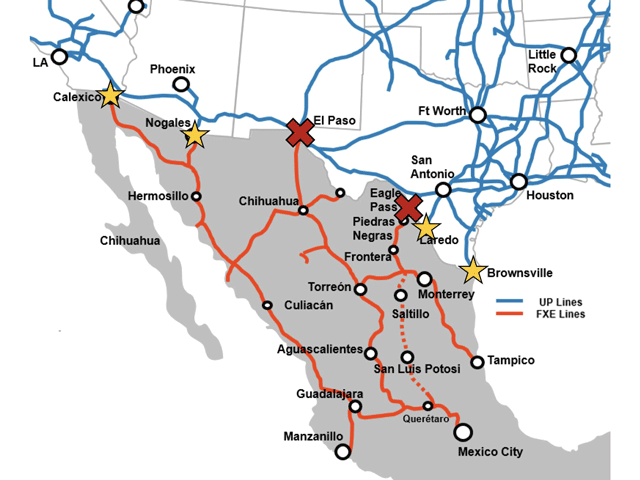US-Mexico Border Reopened for Rail
Texas-Mexico Border Rail Crossings Reopened, Ending Five Days of Drama Over Ag Exports
OMAHA (DTN) -- The latest border crisis for agriculture ended Friday when U.S. Customs and Border Protection announced the reopening of two international crossings for railroads between Texas and Mexico.
The announcement ends five days of drama that led to members of Congress suggesting the decision to close the border was punishing Midwest farmers.
Customs and Border Protection (CBP) officials closed the rail crossings at the Texas cities over El Paso and Eagle Pass on Sunday following a spike in migrant crossings that overwhelmed the Border Patrol.
Mexico is the top destination for several U.S. agricultural products, including corn, wheat, soybean meal, pork and barley. The U.S., meanwhile, relies on Mexico for fresh fruits and vegetables.
After the closure on Sunday, the railroads, agricultural groups and other businesses went into "action alert" mode with their members to call on Congress and the Biden administration to reverse the decision on the railroad closures.
Mike Steenhoek, executive director of the Soy Transportation Coalition, said U.S. reliability as a supplier was a key reason farm groups quickly reacted.
P[L1] D[0x0] M[300x250] OOP[F] ADUNIT[] T[]
"In addition to 'quality,' one of the other components of U.S. agriculture's brand is 'reliability,'" Steenhoek stated Friday. "In order to maintain that reputation, we need to have a supply chain, including railroad border crossings, that can effectively connect farmers with international customers. We appreciate that the border closure was not extended any further as that would have only served to encourage our Mexican customers to explore other sources of supply while imposing further hardship on farmers and agricultural exporters."
The National Grain and Feed Association (NGFA) and the North America Export Grain Association (NAEGA), which strongly protested the closures, said Friday they were pleased the trains would again be moving through Eagles Pass and El Paso. The grain groups wrote a letter with more than 40 other agricultural groups calling on the Department of Homeland Security to immediately reopen the border.
"The North American agricultural supply chain is deeply integrated. Any closure of crossings into Mexico is unacceptable and significantly impacts the flow of grain and oilseeds for both human and livestock feed to one of the United States' most important export markets and trading partners," NGFA and NEAGA stated.
The grain groups added, "We call on the governments of the United States and Mexico to continue to dialogue and to put in place measures on both sides of the border to ensure this does not happen again. The free flow of trade across the border is critical to food security for our countries and the region at large. A plan must be in place to keep the border open to commerce between our nations."
President Joe Biden and Mexican President Andres Lopez Obrador spoke early Thursday about the unprecedented migrant flows in the U.S. Biden asked Secretary of State Tony Blinken and Homeland Security Secretary Alejandro Mayorkas, along with a national security adviser, to visit Mexico in the coming days to see what more the Mexican government could do to stop the migration flow.
Union Pacific issued a statement that the railroad "is relieved the border crossings at Eagle Pass and El Paso, Texas, will reopen. These crossings are critical gateways for international commerce, and the closures had real-world impacts for families, businesses and our customers on both sides of the border. We will restore normal operations as quickly as possible as we work through the five-day backlog of shipments holding to cross the border."
Union Pacific had reported more than 10,000 rail cars were being held up on both sides of the border and were backing up supply chains for more than 60 trains daily. That included agricultural commodities, foods and beverages as well as other products.
Logistically, UP and other railroads now will have to unwind five days of delayed shipments on both sides of the border.
Though Agriculture Secretary Tom Vilsack didn't issue any public statements about the border closure, NGFA and NAEGA also stated they "are particularly appreciative of USDA Secretary Tom Vilsack and members of Congress on both sides of the aisle for their unwavering support and tireless efforts to convince the Department of Homeland Security and CBP of the importance of reopening these crossings to agriculture trade between the United States and Mexico."
In a statement, CBP said rail operations resumed early afternoon on Friday. The agency also stated some of the rationale behind the rail line closures. Over the past several weeks, the agency has had to make several adjustments to operations in Texas and Arizona due to the flood of migrants.
"After observing a recent shift in the trends of smuggling organizations moving migrants through Mexico, CBP took additional actions to surge personnel and address this concerning development, including in partnership with Mexican authorities."
Also see "Senator: Ag Groups Need to Step Up Pressure to Reopen US-Mexico Border Rail Crossings Despite Migrant Influx" here: https://www.dtnpf.com/….
Chris Clayton can be reached at Chris.Clayton@dtn.com
Follow him on X, formerly known as Twitter, @ChrisClaytonDTN
(c) Copyright 2023 DTN, LLC. All rights reserved.




